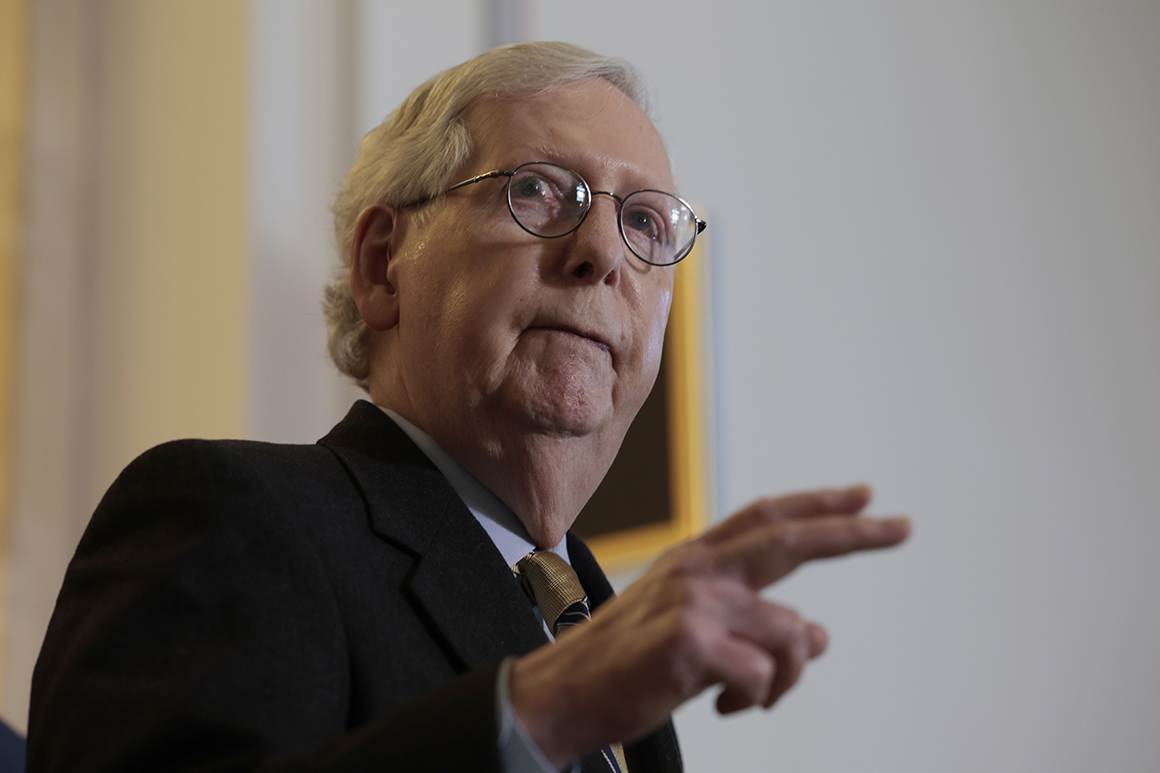“It obviously has some flaws. And it is worth, I think, discussing,” McConnell said Wednesday.
Senate Democrats plan to hold votes on broader election reforms by Martin Luther King Jr. Day, and Majority Leader Chuck Schumer is threatening to change the Senate rules if McConnell leads another GOP filibuster. They want to pass anti-gerrymandering legislation, enshrine Election Day as a holiday and beef up early voting, though doing so would require Manchin and Sinema’s agreement on weakening the filibuster to jam through that legislation on a party-line vote.
Republicans almost uniformly oppose Democrats’ proposals. That leaves little area for common ground on broader voting reform, but perhaps some overlap on how Congress certifies elections.
Both Manchin and Sinema said Wednesday that they were interested in using the Electoral Count Act reform as a springboard to putting together a bipartisan bill. Manchin said it was a “good start, at least they’ve got people talking now.”
“Senator Sinema continues to believe bipartisan action is needed to strengthen our democracy and has been in constant contact with colleagues in both parties on this and other potential areas of common ground,” said John LaBombard, a spokesman for Sinema.
The discussions on changing the Electoral Count Act to make it harder for lawmakers to derail election certifications are in their earliest stages in the Senate. And Schumer scoffed at the possibility of a small-ball deal on Wednesday, the day before the Jan. 6 anniversary.
“The Electoral Count Act [reform] says you can rig the elections anyway you want and then we’ll count it accurately,” Schumer said in an interview. He said he has “very little hope” for a bipartisan deal that includes the more comprehensive reforms his party is seeking to campaign finance and voter access. “We’ve tried for four months and got no support.”
Other progressives share Schumer’s view, with some viewing it as a distraction from their broader goals of expanding ballot access. Sen. Elizabeth Warren (D-Mass.) laughed when asked about Republicans’ stated openness to reform.
“Put your money where your mouth is. Put something on the table and let’s vote,” Warren said. “I want to see something. I’m not off to chase those rabbits until somebody has shown some real detail.”
Sen. Angus King (I-Maine) is trying to do exactly that. He and his staff have been working on a draft of potential reforms, and though he’s spoken with some Republicans about the matter, “I haven’t been able to gauge interest at this point.”
“It’s important, but it’s not the highest priority right now. That’s voting rights and John Lewis. But everybody knows it’s a flawed process and should be reformed. But it applies in 2024,” said King, who caucuses with the Democrats. “I’m interested in it, it’s just a question of when.”
Republicans would view any discussion of the Electoral Count Act as separate from Schumer’s Democratic-only effort and would likely wait for that to conclude before engaging with Democrats. Yet Senate Minority Whip John Thune (R-S.D.) said “there have been some expressions of interest” among Republicans with narrowing Congress or the vice president’s ability to change the election results.
“The role of the vice president needs to be codified, so it’s clear what that is,” Thune said. “There’s some question about how many senators or House members it ought to take to object before it triggers a vote.”
At the moment, it takes just one senator and House member to object to a certain state and force a vote, which has been used by both parties. And though former Vice President Mike Pence followed the precedent in affirming Biden’s win, former President Donald Trump put enormous pressure on him to essentially disregard the election results.
With that in mind, Senate Republicans who voted to certify the election said Wednesday they saw a potential path forward. Sen. Shelley Moore Capito (R-W.Va.) said the Electoral Count Act is a “weak point” in the system that deserves the scrutiny of Congress.
“It is something worth evaluating, and looking for other ways to make sure there is not a way to corrupt the counting process,” said Mitt Romney (R-Utah). “There is interest on both sides to talk about that.”
Some scholars believe, given the impasse on broader election reform and Democrats lacking the votes to change the filibuster, the two parties should pursue something that would prevent a replay of Jan. 6, 2021. On that day, most House and a handful of Senate Republicans teamed to object to Biden’s win in several battleground states, including Arizona — and the certification was interrupted by a violent mob that overran the Capitol.
Eventually, Congress reconvened and finished the job after several people died during the attempted insurrection and scores of police officers were injured. Yet 139 House Republicans and eight Senate Republicans still voted not to certify some of the results that night.
Sen. Chris Coons (D-Del.) said because he’s “an optimist” there’s some merit to at least engaging Republicans on the question of the Electoral Count Act. While he prefers far more sweeping reforms, he said Republicans simply just do not see eye-to-eye with Democrats on expanding voter access.
“If there remains any path forward on making changes to how we protect the Electoral College process and how we ensure a free and fair vote, I’m open to the conversation,” Coons said in an interview. He described his talks with Republicans “as just the tiniest door crack.”





